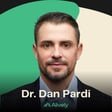
What Is Neurofeedback Therapy with Lisa Cramer - E67
Trouble falling asleep, battling brain fog, or struggling to keep your mind sharp as the years pass? For many, the quest for better sleep and mental clarity turns into a frustrating cycle of quick fixes, medications, and dead ends - especially as stress, age, and life's routines get in the way. This episode uncovers how modern brain training technique, neurofeedback, can help break those patterns, support lasting cognitive health, and even boost your daily performance. You’ll learn the science behind optimizing your mind and how easy, research-backed steps can make a difference, straight from someone at the cutting edge of neurofeedback.
Lisa Cramer is a Board-Certified Neurofeedback Specialist and QEEG Analyst with over 24 years of clinical experience in mental health. She is the founder of Mind Body Neuro of Illinois and Mind Body Neuro of Colorado, where she leads interdisciplinary teams in implementing evidence-based neurotherapy protocols for complex neurological and psychological conditions. Lisa is a strong advocate for integrating EEG-driven modalities as frontline treatments for traumatic brain injury, concussion, degenerative brain disease, chronic pain, mood dysregulation, and cognitive decline. She is dedicated to global education and standardization, advancing the adoption of neurofeedback, photobiomodulation, and neurostimulation in mainstream mental health care.
“As they continue to train each session, the brain figures out sooner and sooner and sooner, and then it starts to show up in regular life.” - Lisa Cramer
In this episode you will learn:
- What neurofeedback is, how it helps retrain brainwaves, and its uses in both healing and performance.
- Why sleep quality is vital for brain health, how neurofeedback can support better sleep, and the science behind it.
- How neurofeedback is used for children, adults, and athletes to improve focus, memory, and overall mental function.
- The ways EEG brain mapping creates a plan for personalized neurofeedback sessions and what happens during training.
- How neurofeedback supports recovery from concussion, anxiety, and cognitive decline, and its potential role in aging well.
- How to choose the right neurofeedback provider and why getting a baseline EEG may benefit your long-term health.
Resources
- Connect with Lisa on Instagram: https://www.instagram.com/mindbodyneuro/
- Get in touch with Lisa on Linkedin: https://www.linkedin.com/in/lisa-cramer-lcpc-bcn-qeegd-l-02304174
- Learn more about Mind Body Neuro: https://www.mindbodyneurotherapy.com/
This podcast was produced by the team at Zapods Podcast Agency:
Find the products, practices, and routines discussed on the Alively website:
















